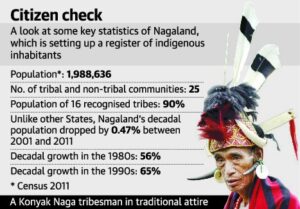In News: Recently, An apex body of Naga tribes has asked the Nagaland government not to be hasty with the exercise to prepare the Register of Indigenous Inhabitants of Nagaland (RIIN), seen as a variant of Assam’s National Register of Citizens.
About Register of Indigenous Inhabitants of Nagaland
- Launched: In July 2019.
- Objective: To prevent outsiders from obtaining fake indigenous certificates for seeking jobs and benefits of government schemes.
- The RIIN will be the master list of all indigenous inhabitants of the state.
- The RIIN list will be based on an extensive survey. It will involve official records of indigenous residents from rural and (urban) wards and would be prepared under the supervision of the district administration.
- No fresh indigenous inhabitant certificate will be issued after the RIIN is completed except for children born to the State’s indigenous inhabitants who will be issued indigenous certificates along with birth certificates. The RIIN database will be updated accordingly.
- The RIIN will also be integrated with the online system for Inner-Line Permit, a temporary document non-inhabitants are required to possess for entry into and travel in Nagaland.
- The entire exercise will be monitored by the Commissioner of Nagaland. In addition, the state government will designate nodal officers of the rank of a Secretary to the state government.

Functions RIIN Committee
- Eligibility criteria to be an indigenous inhabitant.
- To authenticate claims of being indigenous.
- Place of registration as indigenous inhabitant.
- Basis of claims of being indigenous.
- Nature of documents that will be acceptable as proof of being indigenous.
Naga’s Concern Over RIIN
- Locals are apprehensive of “dreadful consequences” if the “advocates of RIIN” implement the identification process with December 1, 1963 – the day Nagaland attained statehood – as the cut-off date for determining the “permanent residents” of the State.
- This date is likely to exclude Nagas who have come from beyond the boundaries of Nagaland.
- Fear that the non-indigenous Nagas could be treated as “illegal immigrants” and their lands and property confiscated.
















